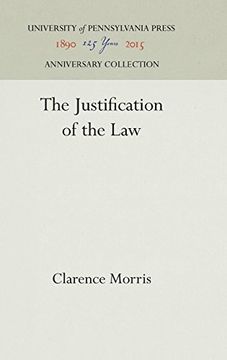Share
The Justification of the law (in English)
Clarence Morris (Author)
·
University Of Pennsylvania Press
· Hardcover
The Justification of the law (in English) - Clarence Morris
$ 71.54
$ 79.95
You save: $ 8.41
Choose the list to add your product or create one New List
✓ Product added successfully to the Wishlist.
Go to My WishlistsIt will be shipped from our warehouse between
Monday, June 10 and
Tuesday, June 11.
You will receive it anywhere in United States between 1 and 3 business days after shipment.
Synopsis "The Justification of the law (in English)"
"Men enjoy justice steadily and by design only when they live in a society that affords opportunities to all . . . to form aspirations for their society."—From the Introduction"The crux about which this book revolves is theory of justice," writes Clarence Morris. In its simplest form, his theory is this: the more the law implements the public's genuine and important aspirations—not its desires for individual gratification but the social, deep-seated unselfish, nonexploitable aspirations—the more just the legal system becomes. "Man's capacity for justice does not flow from divine reason or divine revelation. Men enjoy justice steadily and by design only when they live in a society that affords opportunities in all its inhabitants to develop their capacity to form aspirations for their society."Up to now the world's capacity for justice, so defined, has been small. Some believe that the Western world is still too suppressed for such aspirations and that true justice will emerge only after its liberation. Herbert Marcuse calls for liberation through revolution; John Stuart Mill, relying on man's reason, urged peaceful nonconformity. Both, says Morris, are wrong—but we should learn from Marcuse that every aspiration has an emotional dimension, and we should not allow Mill to persuade us that justice is only a matter of factual discovery. And, since justices are always in flux, the justice of one time or place can become the clumsy legalistics of another.In the light of this theory of justice the author examines the complex logic with which the law must tread its way through the maze of human existence; the need for general rules ("enacted law" and judicial precedents); the function of sociological insights in the development of common law; and the role of statutory penal law, strikingly illustrated from the Chinese Imperial Code.
- 0% (0)
- 0% (0)
- 0% (0)
- 0% (0)
- 0% (0)
All books in our catalog are Original.
The book is written in English.
The binding of this edition is Hardcover.
✓ Producto agregado correctamente al carro, Ir a Pagar.

